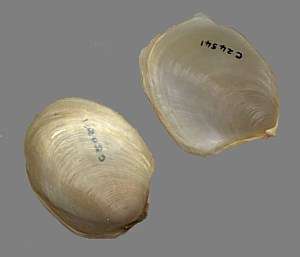Sea Hares? from Jervis Bay, New South Wales
April 28, 1999
From: Terese and Ngaere
ON the beach at Callala beach on Jervis Bay, NSW we found heaps of sea slug looking type of creature washed ashore on 25/04/99. We are curious as to what they are. They were brown in colour with no particular markings although they had flaps on either side of their body which went about 3/4 of the way along their body, they were approx. 6 inches long and were flat underneath however they were fat and rounded on top. They had a tail,antenae on their head which was almost squre shaped. Also what took our interest in particular was a membrane type thing that appeared to shed as they dried out,and harden.It was a pale orange colour and plastic like as it dried. Is it possible that this may be shed from the animal and be the opalised orange shells found on beaches around the area?
Terese and Ngaere
anagram@shoal.net.au

Dear Terese and Ngaere,
I think your animals were Sea Hares, which are a type of Sea Slug. Have a look at the top of this page for some pictures and information on Sea Hares. Your species probably belong to the genus Aplysia. If you click on Search the Forum and type in Aplysia you will find a whole list of references to information on them in the Sea Slug Forum.
The 'membrane type thing' you noticed was their thin flattened shell which tends to crack and break when it dries out because has very little calcium carbonate, the chemical that makes snail shells strong. I have put a photo alongside of the fragile flattened shell of a Sea Hare. I am not sure of which species it is, but they all look very similar.
I suspect the 'opalised orange shells' you find on the beaches are something quite different. I think they are single valves of the bivalve (clam) Anomia or Monia which are often called 'jingle shells' or 'window oysters'. There shells are sometimes strung up for wind chimes hence the name 'jingle shell' and the shells of a large species in the northwestern Pacific, are fairly transparent and so called 'Window Oysters'. I have no idea if they were ever used for windows.
If you look through the Forum you will see that Sea Hares are often found washed up on beaches in large numbers.
Rudman, W.B., 1999 (Apr 28). Comment on Sea Hares? from Jervis Bay, New South Wales by Terese and Ngaere. [Message in] Sea Slug Forum. Australian Museum, Sydney. Available from http://www.seaslugforum.net/find/808Related messages
-
Seahare from Singapore
From: Ron Yeo, March 27, 2007 -
Mystery 'thing' from southern New South Wales.
From: John Ringk, January 12, 2007 -
Are sea slugs poisonous?
From: Tess, January 5, 2007 -
Sea Hare in aquarium - possible trauma
From: Jose Rodriguez, December 14, 2006 -
Sea Hare from Mexico
From: Valerie Simpson, June 7, 2006 -
Sea Hare in aquarium
From: Dominic Chen, March 25, 2006 -
Re: Sea hares bioprospecting
From: Tom Hinchey, March 6, 2006 -
Re: Sea hares bioprospecting
From: Skip Pierce, March 1, 2006 -
Sea hares bioprospecting
From: Tom Hinchey, February 28, 2006 -
California Freshwater Slug?
From: Jason Sabo, July 25, 2005 -
Owning my very own Aplysia
From: Aaran Kelley, September 3, 2002 -
Aplysia siphon
From: Angie Berg, June 15, 2002 -
Seahares? in Florida
From: Kathy, June 1, 2002 -
Reddish brown blob from California
From: Jeanne Frederick, May 30, 2002 -
Ancestors of Aplysia
From: Stephen Hoskins, May 28, 2002 -
What do sea slugs eat?
From: Bill Ballard, May 28, 2002 -
How many Sea Hare species are there?
From: Nathan Loomer, May 24, 2002 -
Sea Hare from Wales
From: Warren Fairclough, April 3, 2002 -
Aplysia and memory?
From: Jay, November 28, 2001 -
What do Sea Hares eat?
From: Danny, July 1, 2001 -
Need info about memory experiment on Aplysia
From: G.Cormier, September 23, 1999 -
Sea Hares from the Marianas Islands
From: Gary Hewitt, July 28, 1999 -
Re: Info on Sea Hares
From: Joel Beasley, May 15, 1999 -
Info on Sea Hares
From: Joel Beasley, May 14, 1999 -
Medical Uses of Sea Slugs
From: Jonathan Choi, May 13, 1999 -
Nudibranch
From: Dana Cianfrani, April 13, 1999 -
Information on Aplysia in Chile
From: Soledad De La Piedra, March 30, 1999 -
Sea Hare research
From: Cary Rogers, February 17, 1999 -
Re: Sea Slugs in Florida
From: Bob Pellegrino, February 15, 1999 -
Sea Slugs in Florida
From: Bob Pellegrino, February 11, 1999 -
Where do I buy Sea Hares?
From: Dallas Carlon, January 12, 1999 -
We need information on Sea Slugs (Hares)
From: Jim Fitzpatrick, December 18, 1998 -
Re: NIH-Aplysia Resource Facility
From: Tom Capo, December 8, 1998 -
Re: NIH-Aplysia Resource Facility
From: Tom Capo, December 6, 1998 -
Want to buy Sea Hares!
From: Bill Rudman, December 5, 1998 -
I need specimens of Aplysia cervina
From: Sara Black Banks, November 20, 1998 -
Sea Hares
From: Sara Loeffler, September 9, 1998 -
Sea slug or something else?
From: Sandi, August 15, 1998 -
Re: How many eggs can a sea hare lay
From: Kathy Potter, June 2, 1998 -
How many eggs can a sea hare lay (2)
From: Teri Taylor, June 2, 1998 -
Re: How many eggs can a sea hare lay (2)
From: Teri Taylor, June 2, 1998 -
How many eggs can a sea hare lay
From: Kathy Potter, June 1, 1998 -
Re: Sea Hares - what are they?
From: Rhiana N. VanDoren, May 24, 1998 -
Sea Hares - what are they?
From: Rhiana N. VanDoren, April 14, 1998
